INTERNACIONAL
Guerra comercial: Donald Trump anunció que los aranceles serán «recíprocos» con todos los países que comercian con Estados Unidos

INTERNACIONAL
Congressman calls on Noem, Dr. Oz with plan to ‘swiftly remove’ 1.4 million illegal migrants on Medicaid
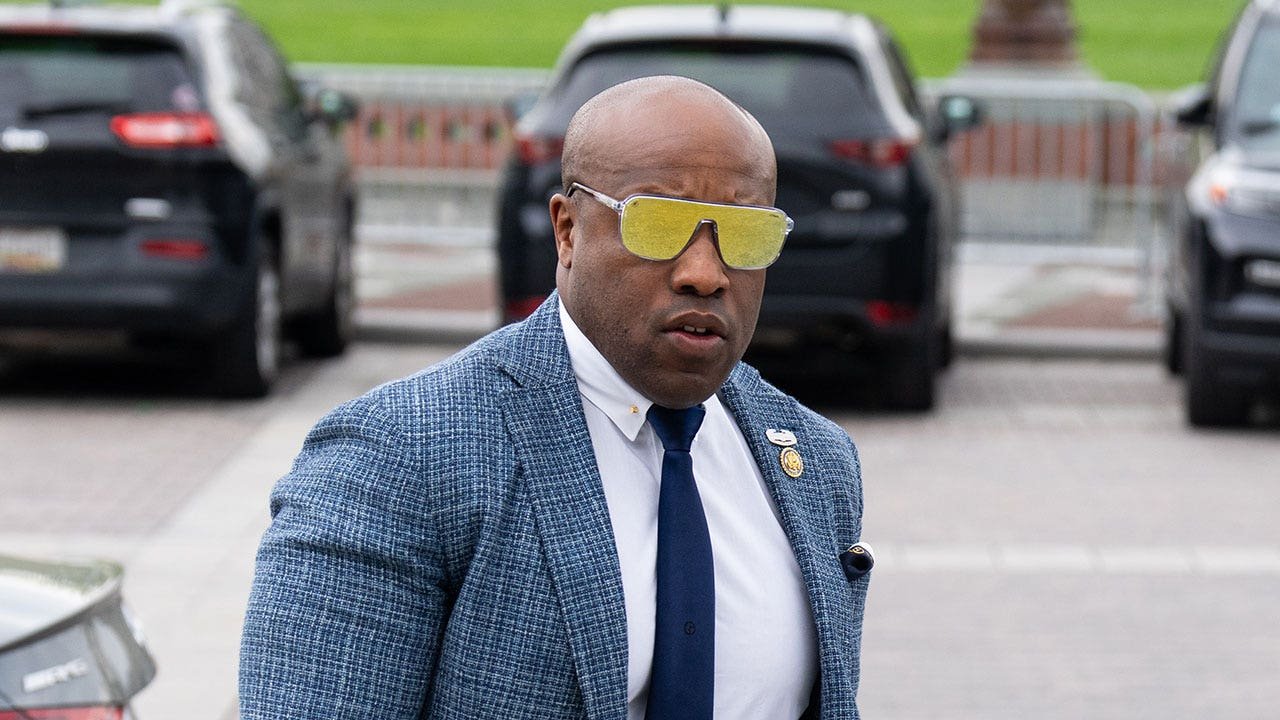
NEWYou can now listen to Fox News articles!
Wesley Hunt, R-Texas, sent letters to two key agency heads with a plan to «swiftly» remove roughly 1.4 million illegal immigrants currently receiving Medicaid in the US.
«While Democrats in Congress continue to peddle falsehoods and fear-mongering over so-called ‘Medicaid cuts,’ they conveniently ignore a staggering truth: over 1.4 million illegal aliens are receiving Medicaid benefits, an unsustainable burden on the American taxpayer,» Hunt told Fox News Digital.
Department of Homeland Security (DHS) Secretary Kristi Noem and Centers for Medicare and Medicaid Services (CMS) Administrator Dr. Mehmet Oz were both recipients of Rep. Hunt’s letter this week, which proposed a task force to «identify» and remove the illegal migrants on Medicaid.
Rep. Wesley Hunt joins Bill Maher on HBO, June 20, 2025.
TRUMP DHS SUES ENTIRE BENCH OF FEDERAL JUDGES IN MARYLAND DISTRICT COURT OVER AUTOMATIC INJUNCTIONS
«I’ve formally requested the Secretary of Homeland Security to establish a task force to identify those unlawfully exploiting our healthcare system and ensure they are swiftly removed from our country,» Hunt added.
The Texas Congressman’s comments come as President Donald Trump’s «One Big Beautiful Bill,» which includes a provision stripping illegal migrants from taxpayer-funded healthcare, faces last-minute changes in the Senate.
Fox News Digital obtained a document from the Congressional Budget Office sent to two GOP committee chairmen this week with information regarding the «One Big Beautiful Bill» that reads:
WHITE HOUSE SAYS CONGRESS DEBATING ‘FOOTNOTES’ ON ‘BIG BEAUTIFUL BILL,’ NOT EXPECTING MAJOR CHANGES
«About 1.4 million would be people who do not meet citizenship and immigration status requirements for Medicaid enrollment but who would be covered under current law in programs funded by the states.»
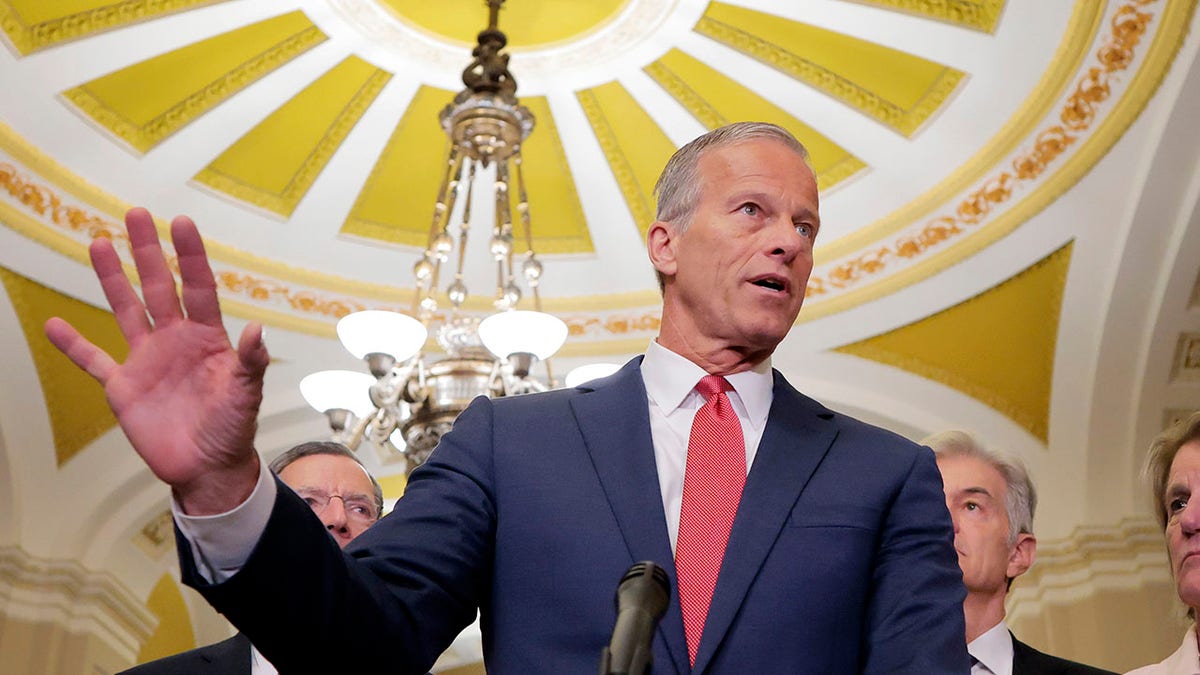
U.S. Senate Majority Leader John Thune (R-SD) speaks along Sen. Shelley Moore Capito (R-WV) during a news conference following the weekly Senate Republican policy luncheon at the U.S. Capitol on June 17, 2025 in Washington, DC. During the news conference Senate Republicans discussed progress with consideration of U.S. President Donald Trump’s «The One Big Beautiful Bill» budget and tax reconciliation bill. (Getty Images)
On Thursday, the Senate Parliamentarian moved to strike out current language in the legislation that would exclude illegal immigrants from Medicaid eligibility, but sources close to negotiations tell Fox News Digital that those portions of the bill are actively being re-drafted in an attempt to ensure they are included in the final draft of the bill.
Senate Majority Leader John Thune, R-South Dakota, also addressed the parliamentarian’s decision to remove the portions about Medicaid to reporters Thursday morning.
TRUMP PRESSURES CONGRESS TO PASS ‘BIG, BEAUTIFUL BILL,’ INSISTING ‘NO ONE GOES ON VACATION UNTIL IT’S DONE’
«These are speed bumps along the way. We anticipated those and so we have contingency plans,» Thune explained. «Obviously, you have to adjust the timing and schedule a little bit, but we’re moving forward.»
Regardless of whether Medicaid is removed from the «One Big Beautiful Bill,» Congressman Hunt says that being able to identify the free healthcare-receiving illegal migrants alone is enough reason to remove them from the US.
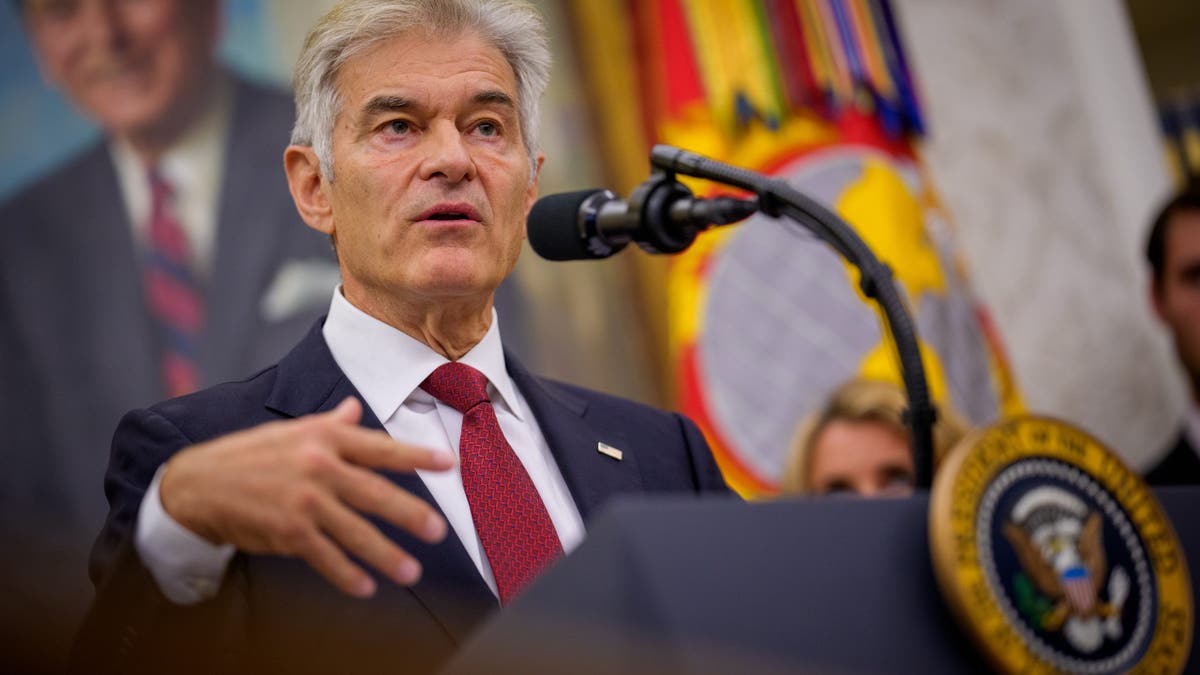
Newly sworn in Medicare and Medicaid Services Administrator Dr. Mehmet Oz speaks during a ceremony in the Oval Office at the White House on April 18, 2025 in Washington, DC. Oz spoke of a desire to provide America access to great care while reducing chronic disease and modernizing Medicare and Medicaid. (Andrew Harnik)
«Through coordinated efforts between DHS and CMS, we can develop an effective approach to identify people based on financial data, residence, or medical records, and then take appropriate action against those violating our immigration laws,» Hunt’s letter to Noem and Dr. Oz reads.
CLICK HERE TO GET THE FOX NEWS APP
«We must protect American resources for American citizens. End of discussion.»
Preston Mizell is a writer with Fox News Digital covering breaking news. Story tips can be sent to Preston.Mizell@fox.com and on X @MizellPreston
INTERNACIONAL
El jefe de la Agencia de Energía Atómica de la ONU, Rafael Grossi, dice que Irán debe mostrar sus instalaciones nucleares para evaluar el daño real

Qué dijo Rafael Grossi
La evaluación de la AIEA
¿Qué pasó con el uranio enriquecido?
Irán no tiene una bomba atómica
INTERNACIONAL
Belarusian dissident thanks Trump admin for his freedom, demands the UN act

NEWYou can now listen to Fox News articles!
EXCLUSIVE — Belarusian dissident Siarhei Tsikhanouski is free after spending more than five years as a political prisoner, and now he is calling for those still behind bars to be released.
In a video message played before the United Nations Human Rights Council in Geneva on Thursday, Tsikhanouski makes a desperate plea for international intervention.
«I was tortured, I was held in solitary confinement, I was frozen. I wasn’t even given a pen to write a few words. For years, I didn’t receive a single letter, not even from my daughter. They filled my ears with lies and propaganda. They tried to convince me that everyone had forgotten me. What is happening in Belarusian prisons is not law enforcement. It is torture, abuse, and the destruction of human beings. People are literally being killed behind bars,» Tsikhanouski said in the video, which was provided to Fox News Digital by UN Watch.
Siarhei Tsikhanouski calls for international action in his video message to the United Nations.
FREED AMERICAN HOSTAGE MARC FOGEL LANDS IN US AFTER YEARS IN RUSSIAN CAPTIVITY
Tsikhanouski credited the international community — especially the Trump administration — for his release, which was secured after U.S. Special Envoy on Ukraine and Russia Gen. Keith Kellogg met with Belarusian President Alexander Lukashenko. In addition to Tsikhanouski, 13 other political prisoners were released through U.S. mediation.
The Belarusian dissident said in the video that he would not have made it out alive if it were not for «international solidarity» and «the efforts of the USA administration.»
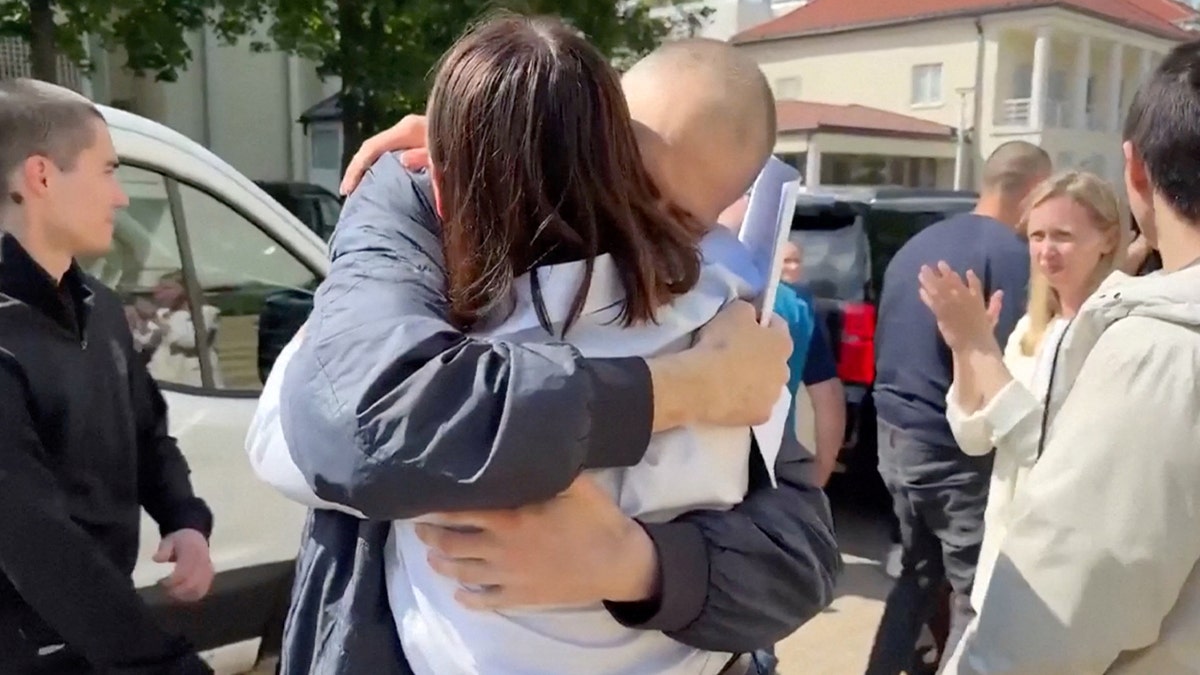
Belarus opposition leader Syarhei Tsikhanouski hugs his wife Sviatlana Tsikhanouskaya after he was released from prison, in this screengrab taken from a social media video released on June 21, 2025. (Sviatlana Tsikhanouskaya via X/via Reuters)
FREED HOSTAGE EDAN ALEXANDER THANKS TRUMP IN EMOTIONAL PHONE CALL: ‘YOU SAVED MY LIFE’
In his first address as U.N. special rapporteur on the situation of human rights in Belarus, Nils Muižnieks warned that, since Jan. 2025, the human rights situation has «continued to deteriorate.» He also noted that authorities in Belarus have abused «highly problematic» legislation, including a prohibition on insulting the president or other public officials.
«Belarus has a very large number of people behind bars who should not be there, including opposition politicians, human rights defenders, journalists, independent trade union activists, environmental defenders and lawyers,» Muižnieks said before Tsikhanouski’s video was played. He also described the ill-treatment of prisoners by Belarusian authorities.
After the council heard Tsikhanouski’s message, Muižnieks said that the recently-freed dissident’s words «carry extra weight.»
Following his release, Tsikhanouski was reunited with his wife, Sviatlana Tsikhanouskaya, and their children in Lithuania. Tsikhanouskaya is the exiled Belarusian opposition leader whom some countries recognize as the president-elect.
Tsikhanouskaya thanked President Donald Trump, Kellogg and the State Department for their efforts, which led to her husband’s freedom.
«My husband Siarhei is free! It’s hard to describe the joy in my heart,» Tsikhanouskaya wrote on X. «We’re not done. 1,150 political prisoners remain behind bars. All must be released.»

Siarhei Tsikhanouski, a Belarusian opposition activist released from a prison by Belarusian authorities, speaks during an interview with The Associated Press in Vilnius, Lithuania, on Sunday, June 22, 2025. (AP Photo/Mindaugas Kulbis)
UN Watch Executive Director Hillel Neuer joined the call to see the remaining 1,150 prisoners gain their freedom.
«Siarhei Tsikhanouski is a symbol of courage who paid a heavy price for daring to challenge Lukashenko’s dictatorship. United Nations Watch is honored to give him the floor at the UN Human Rights Council just days after his release from prison. His voice, silenced by the regime for more than five years as he was tortured in jail, now speaks for millions of Belarusians who continue to demand freedom and human rights,» Neuer told Fox News Digital.
Neuer said Tsikhanouski’s message to the U.N. was «a direct challenge to the regimes that continue to silence their critics.»

A freed Siarhei Tsikhanouski holds a photo of himself taken before he was held behind bars for more than five years. (Office of Sviatlana Tsikhanouskaya via X)
CLICK HERE TO GET THE FOX NEWS APP
Thursday, June 26, also marks the International Day in Support of Victims of Torture. Tsikhanouskaya wrote on X to mark the occasion and shared a photo illustrating the effects that five years in prison had on her husband.
«Today is the International Day in Support of Victims of Torture. My husband survived five years of isolation and cruelty in the Belarus regime’s prisons. Many others still endure it. If we had given up, Siarhei wouldn’t be free. That’s why we keep going—until everyone is home,» Tsikhanouskaya wrote.
According to NPR, Tsikhanouski lost more than 41% of his body weight. He went into prison weighing 298 pounds but weighed just 174 pounds when he was released on June 21.
In response to a request for comment on Tsikhanouski’s statement, UN Human Rights Council spokesperson Pascal Sim directed Fox News Digital to a recording of the hearing, particularly Muižnieks’ remarks.
The U.N. Human Rights Office also directed Fox News Digital to Muižnieks’ statement.
-

 POLITICA3 días ago
POLITICA3 días agoLa Justicia rechazó el pedido de Cristina Kirchner para recibir visitas sin solicitar autorización previa
-

 INTERNACIONAL2 días ago
INTERNACIONAL2 días agoLa guerra en Oriente Medio: el Pentágono contradice a Donald Trump y asegura que el bombardeo a Irán solo retrasó su plan nuclear un par de meses
-
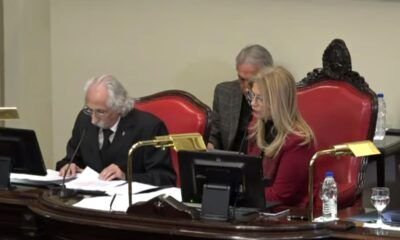
 POLITICA2 días ago
POLITICA2 días agoCon un desempate de Magario, el Senado bonaerense aprobó la reelección indefinida de los legisladores provinciales

































